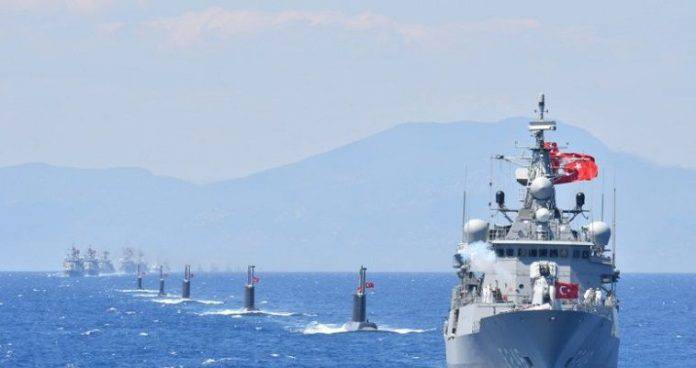Ippokratis Daskalakis: How to reverse the Turkish casus belli
02/09/2020
With no desire to promote fearmongering, we must acknowledge that there is a recent rise in analysts’ recent indications and corresponding assessments that Turkey is seeking military conflict with Greece. This Turkish plan stems from the Turks’ assessment that the threat of military escalation will force Athens -sooner or later- to accept the start of bilateral negotiations according to how they see fit.
In the context of this policy of coercion, the risk of a greater or lesser escalation that will take the form of a hot incident is acceptable (and possibly desirable) by Ankara, but at the same time pursues highlighting Greece as the main culprit responsible for the conflict.
Athens is trying to counter this Turkish strategy by treading between deterrence, moderation, and careful moves at the diplomatic and military levels that inevitably raise doubts not only about their effectiveness but also about the seeming (enduring) choice of dangerous policy.
We do not demonize the policy of appeasement as a temporary option with the aim of multiplying the power factors and/or waiting for better conditions to be created. Unfortunately, however, we see significant delays in taking the imperative action to improve – in Greece’s favor – the balance between military power and timidity and even constant inconsistency in defending Greek positions and sovereign rights.
The importance of 12 nautical miles and the Turkish casus belli
Of course, only time will tell if the above note is correct, which is not the main issue of this analysis. The aim of the text is to point out the need for a more methodical and daring promotion of the increase of the range of Greek territorial waters to 12 nautical miles. A similar move would make most of the Turkish claims in the Aegean area meaningless.
The area of the continental shelf to be adjusted will be drastically reduced while the different airspace-sea area will be solved automatically. Even the Turkish claims for the borders of the search and rescue zone and the Athens FIR will be weakened, as the Aegean will, in the event of expansion, encompass areas of Greek dominion over almost 72% of the Aegean (compared to 43% today). All this will be achieved by simply applying a conventional and customary rule of international law and the painless establishment of certain envisaged measures that will ensure freedom of navigation (definition of narrow international navigation).
Turkey, realizing the unfavorable situation that a corresponding Greek movement will create, has mobilized (successfully to date) the threat of war (casus belli) in case of any expansion of the Greek territorial waters in the Aegean. It is estimated that Ankara will implement, to a greater or lesser degree, its threat, possibly not by resorting to a “declaration of war” but by challenging daily with very provocative actions, and forcefully, the sea zones of the increased Greek territorial waters (and not just).
Indeed, the scene of conflict will become a daily occurrence without being able to rule out a “war of attrition” as experienced by Israel and Egypt in the period 1967-1970. Under this threat, the restraint of all Greek governments and the constant proclamation of the future exercise of the right is completely understandable. Certainly, even the proclamation of this (future) intention is a measure of Greek pressure on Ankara.
It is possible that this Greek intention in the past had resulted in Turkish self-restraint, but the recent unlimited escalation of Turkish claims shows that it has become ineffective. Living under the daily threat of a military conflict, Greece must resort to more dynamic measures, of course taking the necessary risks.
The need to prepare
Turkey and the entire international community must realize (and be properly warned) that any military conflict, regardless of scale, will lead to an automated and irreversible increase of Greek territorial waters to 12 nautical miles. In fact, since one who is already need not fear the rain, the Turkish threat of casus belli will be of little importance, since hostilities will have been initiated.
And in the final analysis, regardless of the outcome of the conflict, it is better to enter the dangerous (but also inevitable) path of negotiations with a range of 12 instead of the current 6 nautical miles. However, a similar Greek warning, in order to be credible, must be accompanied by similar preparations, military, diplomatic, political, and procedural. Briefing foreign countries, provision for compliance with international treaties (definition of international navigation channels), appropriate selection of baselines, closure of bays, readiness for immediate issuance and submission of relevant documents and maps, etc.
To increase the credibility of the Greek threat, the Greek parliament could from today authorize the (any) Greek government to proceed with the immediate increase of the Greek territorial waters in case of Turkish aggression (ie an “anti-casus belli” statement) without of course to give up the autonomous choice of the time to exercise this right.
Certainly, the above proposals carry serious risks of escalation, but now the Turkish declarations and actions demonstrate the impossibility of reaching any peaceful settlement and therefore the overall Greek preparation must focus, not on the welcome avoidance of conflict, but on Greek victory in the inevitable, and quite possibly nightmarish, scenario of conflict.





